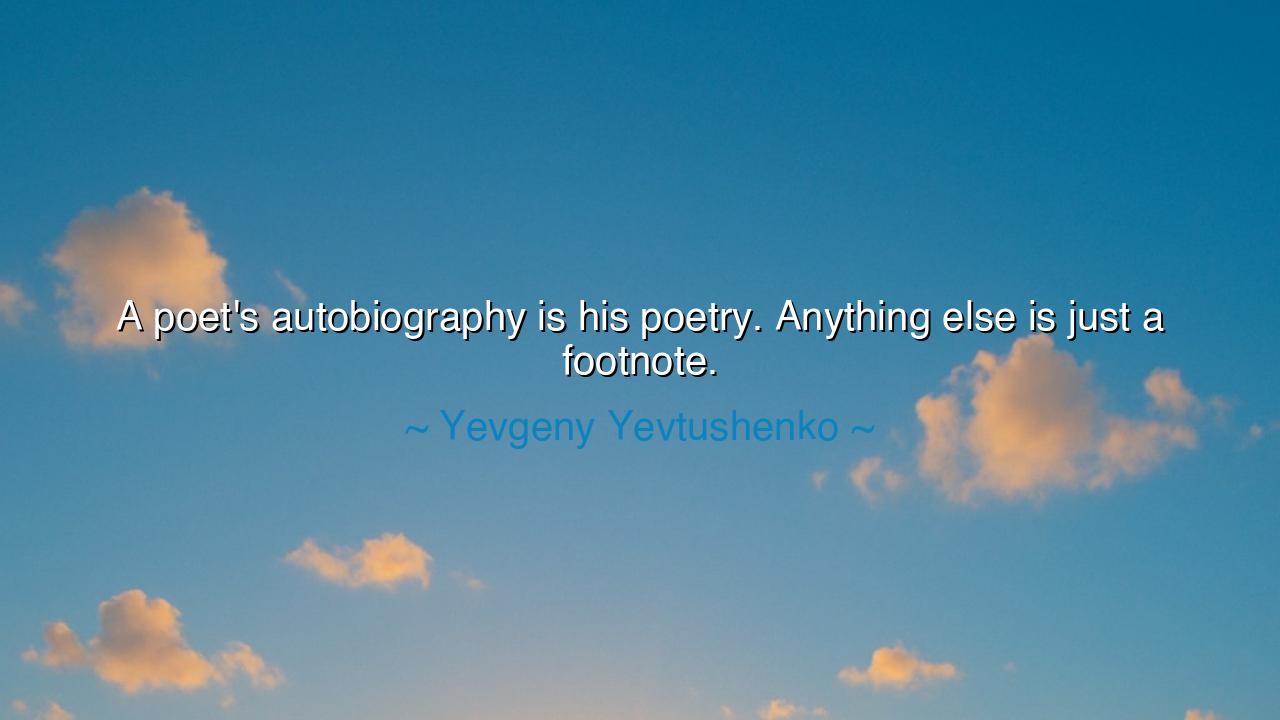
A poet's autobiography is his poetry. Anything else is just a






Hear the words of Yevgeny Yevtushenko, the fiery Russian voice who carried his people’s griefs and hopes in verse: “A poet’s autobiography is his poetry. Anything else is just a footnote.” In this utterance lies a truth that transcends the personal and reaches into the eternal. For the poet does not live his truest life in mere dates, places, or mundane accounts, but in the distilled essence of his words. His poems are not commentary upon his life—they are his life, shaped, heightened, and set in eternal form.
The autobiography of most men is written in prose—chronicles of their actions, their jobs, their journeys. But the poet’s chronicle is hidden in metaphor, rhythm, and image. His verses contain his deepest fears, his most secret longings, his joys, his despairs. To read his poetry is to read his heart directly, while to read his diaries or his speeches is only to glimpse the margins. Thus Yevtushenko declares that all else—the letters, the explanations, the historical accounts—is mere footnote, commentary that cannot equal the living pulse of his poetry.
The ancients knew this truth well. Sappho left us only fragments, yet from them we know her passion, her longing, her soul’s fire. What do we know of her life in ordinary detail? Almost nothing. And yet her poetry is her autobiography, more enduring than any prose could have been. Likewise, Homer, if he lived at all, gave us no personal record; yet his soul survives in the Iliad and Odyssey. His words, not his dates, are his life. Thus across centuries, Yevtushenko joins this lineage, affirming that the poet is remembered not for the facts of his existence, but for the flames he set in verse.
Consider also the story of Anna Akhmatova, Yevtushenko’s predecessor in Russian poetry. She lived under oppression, watched her friends imprisoned and executed, suffered censorship and despair. Her prose life was marked by silence and terror. Yet her poems spoke the truths that could not be uttered aloud. To read them is to walk beside her in those years of anguish. Her “autobiography” is not in her official records, but in the poetry she left behind. All else, indeed, is a mere footnote.
Yevtushenko himself lived through the storms of Soviet Russia, where poets were often silenced, imprisoned, or exiled. He understood that a poet’s life could never be told in government archives or in official accounts. The only honest record was in the poems themselves, for there the poet spoke with courage, even when he could not speak in public. His lines carried his defiance, his compassion, his contradictions. The poems are his life; the rest is only scaffolding, context for the greater truth.
The lesson for us is this: when you wish to know a poet—or any creator—do not seek only their biographies, their timelines, their anecdotes. Seek instead their works, for there they have laid their souls bare. And if you are a creator yourself, know that your truest life is not in your résumé or your ledger, but in the meaning you give shape to—in your words, your art, your acts of beauty and courage. That is what endures when all else is forgotten.
Therefore, remember Yevtushenko’s wisdom: “A poet’s autobiography is his poetry.” Live in such a way that your true record is not the shallow chronicle of days, but the essence of your deeds, your words, and your creations. Let your life be poetry, and let the rest be footnote. For in the end, only what springs from the heart and is given to others in beauty will outlast time.






DLHai Duong Le
This idea of a poet’s autobiography being only their poetry strikes me as both liberating and limiting. Does this mean that poets don’t need to explain their life in interviews, autobiographies, or other forms of writing? Could there be something liberating about this, where the poet is free to express their deepest self solely through their art? But does this approach risk overlooking the complexity of the person beyond the words on the page?
KTLe Thi Kim Tung
Yevtushenko’s quote seems to suggest that poetry is the ultimate form of self-expression, but I wonder if this limits the understanding of a poet. What if a poet’s personal experiences or influences, which don’t make it into their poetry, are just as important to understanding them? Can we fully grasp a poet’s identity without considering their life outside of their work, or is the poetry all we need to know?
NDpham nhat duc
I find Yevtushenko’s view intriguing, but it raises a question: if a poet’s autobiography is only their poetry, does that mean the personal and private aspects of their life are irrelevant? Can a poet choose to conceal certain truths, or is poetry always a raw, honest reflection of self? If we rely on poetry as the ultimate autobiography, how do we separate the poet’s intended message from what is left unsaid or implied?
SCSTien Cao
Yevtushenko’s statement is bold, suggesting that a poet’s work is the truest reflection of their life. It makes me think, though, can a poet’s life ever be fully captured in their poetry? Aren’t there aspects of their personality and experiences that might not come across in their written work? Can we truly understand a poet through their poetry alone, or do we need more context to fully appreciate their worldview?